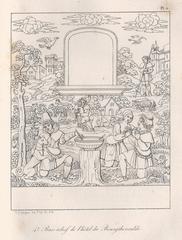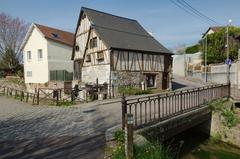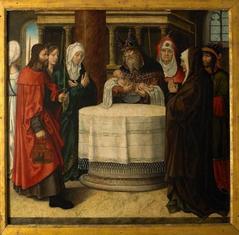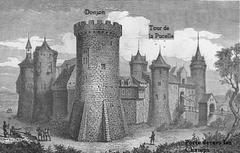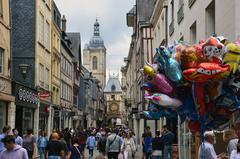
Musée Flaubert et d’Histoire de la Médecine: Visiting Hours, Tickets, and Complete Guide to Rouen’s Literary and Medical Landmark
Date: 04/07/2025
Introduction
Situated in the historic Hôtel-Dieu in Rouen, France, the Musée Flaubert et d’Histoire de la Médecine offers an immersive exploration of two intertwined legacies: the literary genius of Gustave Flaubert and the evolution of Western medicine. As the birthplace of Flaubert and the former residence of his father, Achille-Cléophas Flaubert—chief surgeon of the hospital—the museum brings together intimate biographical details, unique medical artifacts, and the architectural heritage of a building that has stood since the 12th century. This guide provides detailed information on museum history, collection highlights, practical visitor details including hours and ticketing, accessibility, and tips to ensure you make the most of your visit (France-Voyage, Musée Flaubert Official Website).
Table of Contents
- Introduction
- Historical Background: Hôtel-Dieu and the Flaubert Family
- Museum Creation and Heritage Designations
- Exhibition Themes and Collection Highlights
- Architectural and Cultural Importance
- Visiting Information: Hours, Tickets, Location
- Accessibility and Visitor Services
- Guided Tours, Events, and Family Activities
- Planning Your Visit: Tips and Nearby Attractions
- Frequently Asked Questions
- Conclusion
- References and Further Reading
Historical Background: Hôtel-Dieu and the Flaubert Family
The museum’s setting in the Hôtel-Dieu connects visitors to centuries of Rouen’s medical and social history. Established in the 12th century, this hospital was the city’s primary medical institution for hundreds of years, adapting to scientific advances and public health needs through the ages. The Flaubert family’s residence in the hospital’s pavilion—where Gustave Flaubert was born in 1821—uniquely situates the novelist’s early life at the crossroads of literature and medicine. The influence of his father’s profession is evident in Flaubert’s works, notably in the medical realism of “Madame Bovary” (France-Voyage).
Museum Creation and Heritage Designations
Recognizing the dual cultural significance of the site, local authorities and heritage advocates established the museum in 1901. Over time, the institution expanded its scope from a tribute to the Flaubert family to a comprehensive center for medical history. Today, it is recognized as a “Musée de France” for its national importance and designated a “Maison des Illustres,” honoring its connection with an influential figure in French culture. The Hôtel-Dieu building itself is a protected Historic Monument, ensuring the preservation of both its architecture and its legacy (France-Voyage).
Exhibition Themes and Collection Highlights
The museum’s eleven permanent galleries weave together the personal history of the Flaubert family and the broader story of medical progress from medieval times through the early 20th century. Noteworthy exhibits include:
- Flaubert Family Apartment: The birthplace of Gustave Flaubert, reconstructed with period furnishings and personal effects, including his writing desk and inkwell.
- Cabinet of Curiosities: Showcasing unusual and sometimes macabre artifacts that reflect historical medical practices.
- 18th-Century Birthing Mannequin: Used for midwifery instruction, exemplifying the development of medical education.
- Six-Seater Hospital Bed: Illustrating historical hospital conditions and patient care.
- Leech Perch: A visual reminder of the once-common practice of bloodletting.
- Reconstructed Dental Office and Apothecary: Immersive displays of healthcare workspaces from the 18th and 19th centuries.
- Rare Medical Texts and Manuscripts: Including annotated works by Achille-Cléophas Flaubert and literary memorabilia belonging to the family (LeShuttle Guide).
The museum also features temporary exhibitions, often exploring the intersection of literature, medicine, and 19th-century French society.
Architectural and Cultural Importance
The Hôtel-Dieu pavilion retains its 19th-century hospital ambiance, with preserved period features and decor. Recognized both as a “Maison des Illustres” and a Historic Monument, it stands as an essential part of Rouen’s cultural and architectural heritage, illustrating the evolution of public health infrastructure and celebrating the achievements of the Flaubert family.
Visiting Information: Hours, Tickets, Location
Address: 51 rue de Lecat, 76000 Rouen, France
Opening Hours:
- Tuesday: 10:00–12:30 and 14:00–18:00
- Wednesday to Saturday: 14:00–18:00
- Closed: Sundays, Mondays, and public holidays
- Last admission: 30 minutes before closing
Admission:
- Permanent collections: Free
- Temporary exhibitions and special guided tours: Typically €5 (reduced rates for students, seniors, and groups)
- Free for: Visitors under 18, museum friends, and CHU staff
Contact:
Phone: +33 2 76 30 39 90
Email: [email protected]
Official website
Accessibility and Visitor Services
The museum is committed to accessibility:
- Physical access: Ramps, elevators, accessible restrooms, and designated parking.
- Sensory/cognitive support: Braille and large-print materials; tactile and audio resources; magnetic induction loops; French Sign Language tours; easy-to-read documents.
- Recognition: “Musée de France” and “Maison des Illustres” status; the local tourist office holds the “Tourisme & Handicap” mark.
Facilities:
- Restrooms: Accessible toilets available.
- Cloakroom: None; travel light.
- Shop/Café: No on-site café; many options nearby.
- Photography: Allowed for personal use (no flash); restrictions apply for special exhibitions.
Guided Tours, Events, and Family Activities
- Guided Tours: Regularly available in French (adults and school groups); English tours by prior arrangement.
- Audio Guides: Multilingual options available.
- Workshops and Family Programs: Thematic tours such as “Les animaux du musée Flaubert et d’histoire de la médecine,” creative workshops, and storytelling sessions are offered, especially during holidays.
- Special Events: Includes the European Night of Museums with nocturnal visits and interactive experiences. Check the official website for a current calendar.
Planning Your Visit: Tips and Nearby Attractions
Getting There
- Public Transport:
- TEOR Bus Lines 1, 2, 3 (Pasteur-Panorama stop)
- TEOR Line 4 (Vieux-Marché stop)
- Cy’Clic bike station at Pasteur – Fac de Droit
- On Foot: 10-minute walk from Rouen train station; 5 minutes from Place du Vieux-Marché
- By Car: Paid parking nearby, including spaces for visitors with disabilities
Visit Tips
- Best Time: Visit on weekday mornings or early afternoons to avoid crowds.
- Language: Most signage in French; some English materials—check availability in advance.
- Duration: 1–1.5 hours for permanent collections; longer if joining guided tours or workshops.
- Nearby Attractions:
- Place du Vieux-Marché
- Rouen Museum of Fine Arts
- Joan of Arc Museum
- Le Secq des Tournelles Museum
- Rouen Cathedral
Combining these sites with your museum visit provides a rich overview of Rouen’s cultural heritage (SoloSophie Guide).
Frequently Asked Questions
Q: What are the Musée Flaubert et d’Histoire de la Médecine’s opening hours?
A: Tuesday 10:00–12:30 and 14:00–18:00; Wednesday–Saturday 14:00–18:00; closed Sundays, Mondays, and public holidays.
Q: Is admission free?
A: Entry to permanent collections is free. Some temporary exhibitions and guided tours may require tickets (€5).
Q: Is the museum accessible for visitors with disabilities?
A: Yes, with physical and sensory accessibility features and support.
Q: Are guided tours available in English?
A: English tours are available by prior arrangement; check with the museum in advance.
Q: Can I take photos?
A: Yes, for personal use; follow signage and staff instructions.
Q: Do I need to book in advance?
A: Individual visits are walk-in for permanent collections; groups and tours should book ahead.
Conclusion
The Musée Flaubert et d’Histoire de la Médecine is a cornerstone of Rouen’s cultural landscape, merging the literary legacy of Gustave Flaubert with the rich tapestry of medical history. Its accessible, well-curated exhibits and engaging programs make it suitable for literature lovers, history enthusiasts, families, and travelers seeking a deeper understanding of 19th-century France. Take advantage of the museum’s central location to explore nearby historic sites, and consult the official site for current exhibitions and visitor updates. For an enhanced experience, consider downloading the Audiala app for guided audio tours and event notifications.
References and Further Reading
- This guide draws from the following sources:
France-Voyage
Musée Flaubert Official Website
LeShuttle Guide
Musées Normandie
SoloSophie Guide
For additional inspiration, explore more of Rouen’s museums and literary sites via these resources.


